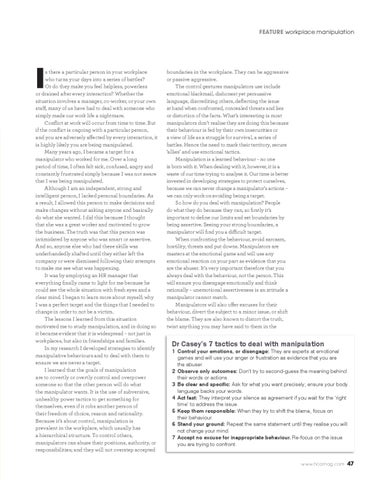FEATURE workplace manipulation
I
s there a particular person in your workplace who turns your days into a series of battles? Or do they make you feel helpless, powerless or drained after every interaction? Whether the situation involves a manager, co-worker, or your own staff, many of us have had to deal with someone who simply made our work life a nightmare. Conflict at work will occur from time to time. But if the conflict is ongoing with a particular person, and you are adversely affected by every interaction, it is highly likely you are being manipulated. Many years ago, I became a target for a manipulator who worked for me. Over a long period of time, I often felt sick, confused, angry and constantly frustrated simply because I was not aware that I was being manipulated. Although I am an independent, strong and intelligent person, I lacked personal boundaries. As a result, I allowed this person to make decisions and make changes without asking anyone and basically do what she wanted. I did this because I thought that she was a great worker and motivated to grow the business. The truth was that this person was intimidated by anyone who was smart or assertive. And so, anyone else who had these skills was underhandedly shafted until they either left the company or were dismissed following their attempts to make me see what was happening. It was by employing an HR manager that everything finally came to light for me because he could see the whole situation with fresh eyes and a clear mind. I began to learn more about myself; why I was a perfect target and the things that I needed to change in order to not be a victim. The lessons I learned from this situation motivated me to study manipulation, and in doing so it became evident that it is widespread – not just in workplaces, but also in friendships and families. In my research I developed strategies to identify manipulative behaviours and to deal with them to ensure we are never a target. I learned that the goals of manipulation are to covertly or overtly control and overpower someone so that the other person will do what the manipulator wants. It is the use of subversive, unhealthy power tactics to get something for themselves, even if it robs another person of their freedom of choice, reason and rationality. Because it’s about control, manipulation is prevalent in the workplace, which usually has a hierarchical structure. To control others, manipulators can abuse their positions, authority, or responsibilities; and they will not overstep accepted
boundaries in the workplace. They can be aggressive or passive aggressive. The control gestures manipulators use include emotional blackmail, dishonest yet persuasive language, discrediting others, deflecting the issue at hand when confronted, concealed threats and lies or distortion of the facts. What’s interesting is most manipulators don’t realise they are doing this because their behaviour is fed by their own insecurities or a view of life as a struggle for survival, a series of battles. Hence the need to mark their territory, secure ‘allies’ and use emotional tactics. Manipulation is a learned behaviour – no one is born with it. When dealing with it, however, it is a waste of our time trying to analyse it. Our time is better invested in developing strategies to protect ourselves, because we can never change a manipulator’s actions – we can only work on avoiding being a target. So how do you deal with manipulation? People do what they do because they can, so firstly it’s important to define our limits and set boundaries by being assertive. Seeing your strong boundaries, a manipulator will find you a difficult target. When confronting the behaviour, avoid sarcasm, hostility, threats and put downs. Manipulators are masters at the emotional game and will use any emotional reaction on your part as evidence that you are the abuser. It’s very important therefore that you always deal with the behaviour, not the person. This will ensure you disengage emotionally and think rationally – unemotional assertiveness is an attitude a manipulator cannot match. Manipulators will also offer excuses for their behaviour, divert the subject to a minor issue, or shift the blame. They are also known to distort the truth, twist anything you may have said to them in the
Dr Casey’s 7 tactics to deal with manipulation
1 Control your emotions, or disengage: They are experts at emotional games and will use your anger or frustration as evidence that you are the abuser. 2 Observe only outcomes: Don’t try to second-guess the meaning behind their words or actions. 3 Be clear and specific: Ask for what you want precisely; ensure your body language backs your words. 4 Act fast: They interpret your silence as agreement if you wait for the ‘right time’ to address the issue. 5 Keep them responsible: When they try to shift the blame, focus on their behaviour. 6 Stand your ground: Repeat the same statement until they realise you will not change your mind. 7 Accept no excuse for inappropriate behaviour. Re-focus on the issue you are trying to confront.
www.hcamag.com
47
